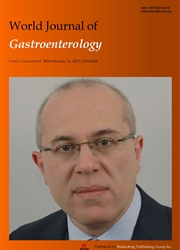

 中文摘要:
中文摘要:
AIM:To evaluate the efficacy and safety of paclitaxelnedaplatin combination as a front-line regimen in Chinese patients with metastatic esophageal squamous cell carcinoma(ESCC).METHODS:A two-center,open-label,single-arm phaseⅡstudy was designed.Thirty-nine patients were enrolled and included in the intention-to-treat analysis of efficacy and adverse events.Patients received 175mg/m2of paclitaxel over a 3 h infusion on 1 d,followed by nedaplatin 80 mg/m2in a 1 h infusion on 2 d every3 wk until the documented disease progression,unac-ceptable toxicity or patient’s refusal.RESULTS:Of the 36 patients assessable for efficacy,there were 2 patients(5.1%)with complete response and 16 patients(41.0%)with partial response,giving an overall response rate of 46.1%.The median progression-free survival and median overall survival for all patients were 7.1 mo(95%CI:4.6-9.7)and 12.4 mo(95%CI:9.5-15.3),respectively.Toxicities were moderate and manageable.Grade 3/4 toxicities included neutropenia(15.4%),nausea(10.3%),anemia(7.7%),thrombocytopenia(5.1%),vomiting(5.1%)and neutropenia fever(2.6%).CONCLUSION:The combination of paclitaxel and nedaplatin is active and well tolerated as a first-line therapy for patients with metastatic ESCC.
 英文摘要:
英文摘要:
AIM: To evaluate the efficacy and safety of paclitaxel-nedaplatin combination as a front-line regimen in Chinese patients with metastatic esophageal squamous cell carcinoma (ESCC). METHODS: A two-center, open-label, single-arm phase II study was designed. Thirty-nine patients were enrolled and included in the intention-to-treat analysis of efficacy and adverse events. Patients received 175 mg/m2 of paclitaxel over a 3 h infusion on 1 d, followed by nedaplatin 80 mg/m2 in a 1 h infusion on 2 d every 3 wk until the documented disease progression, unacceptable toxicity or patient’s refusal. RESULTS: Of the 36 patients assessable for efficacy, there were 2 patients (5.1%) with complete response and 16 patients (41.0%) with partial response, giving an overall response rate of 46.1%. The median progression-free survival and median overall survival for all patients were 7.1 mo (95%CI: 4.6-9.7) and 12.4 mo (95%CI: 9.5-15.3), respectively. Toxicities were moderate and manageable. Grade 3/4 toxicities included neutropenia (15.4%), nausea (10.3%), anemia (7.7%), thrombocytopenia (5.1%), vomiting (5.1%) and neutropenia fever (2.6%). CONCLUSION: The combination of paclitaxel and nedaplatin is active and well tolerated as a first-line therapy for patients with metastatic ESCC.
 同期刊论文项目
同期刊论文项目
 同项目期刊论文
同项目期刊论文
 期刊信息
期刊信息
